- Home
- Julian May
Jack the Bodiless Page 2
Jack the Bodiless Read online
Page 2
I’ll take you myself … more gently.
Rogi’s eyes narrowed and he squinted at the portion of air from which his invisible companion’s thoughts appeared to emanate. “So! You Lylmik do have a mitigator for the pain of hyperspatial translation—just like Ti-Jean always said you did.”
Yes. Jack was perceptive as always. But the device is not yet appropriate for general use among our client races in the Galactic Milieu. You will make no mention of it.
Rogi spooned down chili and drank coffee. “I wouldn’t dream of violating the glorious Lylmik master scheme … But what’s the damn rush to get me humping again on the Memoirs?”
One has one’s reasons.
Rogi rolled his eyes hopelessly. Then for some time he ate in silence, his mind idly recapitulating the things he had already written and shuffling through what would come next, in the period following the Great Intervention. “Gonna take another book, big as the last one, to cover the thirty-eight years of the Simbiari Proctorship. Be a pain in the ass for me to get all those family shenanigans sorted out, too.”
Unifex said: I want you to skip over most of that and begin immediately on Jack’s early life and disincarnation, and the growing threat of human opposition to Galactic citizenship. Then you will describe Dorothea’s part in the earlier drama, and finish up with your view of the Metapsychic Rebellion, making a Milieu Trilogy. The events of the painful Proctorship years, the time before the Human Polity was admitted to the Galactic Concilium, have been covered well enough by Philip and Lucille in their own autobiographies. But they never knew Jack’s full story, or Diamond’s—
“Or yours, mon cher fantôme.”
Or mine.
“I’ll have to backtrack some to make it hang together, you know. Start out with a kind of retrospective digression. And I’ll still need a lot of fill-in help from you to give a proper overall picture.”
I realize that.
“Is that why—” Rogi paused. He swallowed hard, banishing a certain thought before it could be formulated, even subvocally. “Eh bien, mon fils. I reckon you know what you’re doing by now.”
Beyond a doubt. To paraphrase one of your favorite fantasy writers, even the most modest intellect can hardly help learning a thing or two after six million years.
The old man grinned with forced cheerfulness at the vaporous air. “Six million … Ah, those self-rejuvenating Remillard genes! A real drag, immortality, eh? Not that I’m ready to knock it myself yet, you understand. Um … do you know … can you foresee when I’m …”
Not really. Moi, je ne suis pas le bon dieu, j’t’assure! But I do intend to see to it that you survive at least long enough to finish the family chronicle.
“Well, thanks all to hell for small favors.”
Rogi licked the last of the apple cobbler from his spoon and drank the dregs of the coffee. Then he switched the stove to the dishwashing mode and thrust the tableware inside. A moment later, he began to pack everything away, singing the chorus of Dartmouth College’s “Winter Song” under his breath.
At length the Remillard Family Ghost said: Are you ready, Uncle Rogi? The trip home will take only a moment. There will be none of the usual discomfort of hyperspatial translation experienced in a starship.
“Not in my underwear, dammit!”
The old man began to throw his clothes back on. He managed his pants and shirt before he disappeared abruptly from the snow grotto, and all his gear with him.
The lichenoid cast a faint phosphorescent glow about the newly darkened chamber. There was a rustling sound, then a medley of plops as the crablike exotic animals came rushing from their burrows to scavenge leftover bits of Earth cheese. Outside the snow grotto, the Denali blizzard wind howled.
1
FROM THE MEMOIRS OF ROGATIEN REMILLARD
I STILL HAVE THE NIGHTMARE SOMETIMES. I HAD IT ON THE night that I was unceremoniously translated from the planet Denali to Earth at the truncated end of my skiing holiday and commanded to resume writing these Memoirs.
As always, the dream played itself out in a weird, accelerating time-lapse mode. There is nothing terrifying about the scene at first. A beautiful mother holds an infant, completely wrapped in a blanket, and she looks up from the baby as a fourteen-year-old boy approaches. This older child of hers has a strangely ominous aura about him. He has come hurriedly home from his classes at Dartmouth College on a blustery day, and he wears black turbocycle leathers and carries a much-modified visored helmet tucked under his arm. His eyes are gray and his mind opaque, and his smile is tentative and quirkily one-sided as he accepts his mother’s invitation to open the blanket and see his new little brother for the first time … in the flesh.
The black-gloved hands are trembling slightly with an emotion that the older boy despises and tries vainly to check. And then the baby lies revealed, unclothed, perfect. And the minds of Marc and Teresa mingle in joy:
Mama he’s all right!
YesyesYES!!
Papa was wrong the genetic assay was wrong—Yes dear wrong wrong wrong little Jack’s body is normal and his mind his mind …!
Mind?
Oh Marc dear his mind just speak to him it’s wonderful don’t be afraid to wake him …
The baby’s delicate eyelids open.
And in my dream, there are no eyes.
I hear laughter, and I recognize the voice of Victor. But it can’t be Victor because he died twelve years before Jack was born; and for nearly twenty-seven years before that he was helpless, disembodied as Jack would be but unlike Jack deprived of all metafunction, all physical and mental contact with the world outside himself. In my dream, the devilish laughter fades in a smell of pine and a cataract of pain. Tears pour down Marc’s face for the first time in his austere young life. The eyeless infant smiles at us—
And suddenly the real nightmare takes charge.
No eyes. Only a void, a starless darkness that is somehow alive with fearsome knowledge. My dream races on, and Teresa and young Marc are gone. There is only a pathetic little child shackled to complex life-supportive equipment, and while I watch in horror, his human form begins to disintegrate.
I try to tear my gaze away from the awful sight, but I cannot. Faster and faster, the self-destructive process programmed by his own body proceeds.
The child’s despairing mother blames her own hubris for his suffering. His father, Paul, countering his own pain with clinical detachment, finds the disincarnation bleakly fascinating. Marc sees his first glimpse of Mental Man. Denis Remillard and Colette Roy and the other scientists of the Human Polity call the child a prochronistic mutant, an anomaly born out of proper time, too early in the scheme of biological evolution, a throw-forward in the pattern of orderly human development. Four of the exotic races of the Galactic Milieu, pitying, call the little boy pathetic and doomed. The enigmatic Lylmik refuse to discuss his case at all, except for flatly prohibiting his euthanasia.
In the dream, my mind is shrieking: No no Ti-Jean no God no how can you let his body die while his brain lives the brain the wonderful potent superbrain God why why—
Then I see the brain naked.
I plead: Let it die too let the poor thing die stop the machines the genetic engineering attempts the futile meddling let him go in peace let him go!
A monster that does not know its self sees the brain as the Great Enemy, and in a cataract of flame the machines are stopped.
I hear the laughter of the dead fiend again as Victor savors the hideous irony of the situation. For the brain that is Jack the Bodiless does not die, but lives. Impossibly, it lives, impervious, sustaining itself in some arcane psychoredactive fashion, nourished by the atmosphere and by photons, enduring and adapting and learning and growing in wisdom and grace and dieu de dieu I am so afraid of it paralyzed with dread even as it tries to reassure me and in my dream I call its name:
Ti-Jean! Jack!
This horrifying mutant, this thing, is still my dear little great-grandnephew Jon Remillard, a b
rilliant and vibrant little human person only three years old, trapped in 1.7 kilograms of unsupported humanoid encephalic protoplasm.
None of Jack’s eventual triumph penetrates my nightmare. I know only my own fear and revulsion and a demonic whisper: Who will be the next to disincarnate? Perhaps you, Rogi?…
Then Marc is at my side again, much older. This time his dark armor is the glistening wet body-monitoring coverall of a cerebroenergetic enhancer, the perilous mind-boosting device outlawed by the Galactic Milieu. Marc studies the bodiless thing that is his mutant brother with open admiration. And a paradoxical envy.
I see a warning reflected from eyeless depths, and Marc sees it, too.
Jack’s mind tells us: No. Human is better. For you, Marc. For all of you.
Marc smiles and shakes his head, denying. Mental Man is the inevitable, the culmination of all rational being—and there is no need to wait upon evolution’s laggard pace for His coming. He can be summoned—
Suddenly I see three persons suspended in interstellar space: a faceless woman clad in a suit of diamonds, a blazing plasma that enfolds the first Mental Man, and a black armored shape leading an interstellar armada in opposition to the other two. The Metapsychic Rebellion of humanity against the Galactic Milieu has begun.
At my dream’s climax, a blue-and-white planet explodes, haloed by a mass death-shout. And in that terrible moment the Galactic Milieu, the benevolent confederation that saved the human race from its own folly and gave us the stars as a playground, itself begins to die …
The dream always ends at this point, before the final resolution, and I return to consciousness freezing and paralyzed, with a half-strangled scream caught in my throat.
Peace! T’en fais pas, Rogi! Calm yourself and relax. It all happened long ago, and now at last in the writing of this personal chronicle you have a way of exorcising the nightmare once and for all.
Perhaps you already know me from the introductory volume of these Memoirs. If you do not, let me introduce myself briefly. My name is Rogatien Remillard, and I am sometimes called Roger but more often simply Uncle Rogi (pronounced, appropriately enough, as “rogue he”) by those who find my Christian name impossibly ethnic. It is of French origin, and the Remillards are a sizable family who originally were colonists in Quebec and later migrated to the northeastern United States, where there was a large but unobtrusive Franco-American population.
I have for most of my life been a bookseller in the college town of Hanover, New Hampshire. I have a small antiquarian bookshop, The Eloquent Page, where rare old twentieth-century fantasy and science fiction books printed on carefully conserved paper are offered to connoisseurs at atrocious prices. Although I belong to a family of acknowledged mental giants, my own intellectual and metapsychic functions are meager. This has not prevented me from being caught up in the chequered careers of my more illustrious relatives. On the contrary, I have played at times a rather significant role in the family’s machinations—something that Milieu historians have seen fit to ignore—and I have witnessed from my worm’s-eye view the rise and fall of many a Galactic worthy and villain, including two saints and one notorious individual whose misdeeds were so appalling that he was known as the Angel of the Abyss.
I have never married, but I have loved unwisely several times. I have faced imminent death on quite a few occasions and survived through improbable happenstance. I have killed three persons in cold blood, even though I am the most easygoing and peaceable of men, and one of them was a person I loved deeply.
My fraternal twin brother, Donatien, and I were born in the year 1945, in the New England mill town of Berlin, New Hampshire. Our young father had already been killed during World War II, and our mother died giving birth to us, so we orphans were raised by our kindly aunt and uncle, who had six children of their own.
But no members of the Remillard clan except my brother and I had the “immortality” genes, whose existence was not confirmed until after the Intervention, nor did they possess the genes for higher mindpowers. (It was many years before my twin brother and I discovered that we were not unique in our metapsychic operancy.) How we two responded to our more frightening metafunctions is a story that I have already related at some length. In brief, I learned to live with such powers as telepathy, psychokinesis, and metacoercion, while Don was ultimately destroyed by them, tragically killed when he was only forty-four.
I was rendered sterile by a childhood illness. Don had ten offspring, and all of them inherited the genes for high metafunction and self-rejuvenation; but only the two oldest children were able to utilize their extraordinary mindpowers. Circumstances made Don’s oldest child, Denis, become a foster son to me; and it was he who founded with his operant wife Lucille Cartier the so-called Remillard Dynasty, which eventually included many of the most powerful minds the human race has ever known. Don’s second son, Victor, was not as intellectually brilliant as his older brother; but his metapsychic mindpowers were probably even more formidable, and he used them ruthlessly for his own self-aggrandizement until he was finally struck down, immediately prior to the Great Intervention, either by me or by the mysterious being I had learned to call the Family Ghost.
From time to time, especially when I am drunk and morose and seized with that melancholy feeling of inescapable doom that francophones call malheur, I have been tempted to believe that the Family Ghost is nothing more than a construct of my own imagination. But if that is true, then by default I am responsible not only for the Great Intervention but for the Metapsychic Rebellion as well, and ultimately for the even more momentous events that came afterward, bringing the long story full cycle.
But that would be too farfetched a practical joke, even for le bon dieu, who is so full of them.
So let me begin this Galactic Milieu Trilogy without further maunderings, first with a retrospective.
2
A RETROSPECTIVE DIGRESSION BERLIN, NEW HAMPSHIRE, EARTH 30 MARCH 2040
ROGI DROVE INTO THE TOWN OF HIS BIRTH LATE ON A DREARY spring afternoon, bringing Teresa and little Marc with him from Hanover, as he had been instructed to. Wrathful and profane protests to the contrary had got Rogi nowhere: Paul had been adamant. This time Rogi, too, would come to Berlin and participate in the annual ritual because Denis had insisted upon it. And that was that.
It always seemed to rain on Good Friday, but at least this year the rain was warm, and it was making short work of the remnant patches of street ice and the old gray mounds of snow that still lay about in the sun-starved nooks of town. By Easter, Rogi told himself subvocally, Berlin would be nearly washed clean. The pussy willows in the gardens along the Androscoggin River, where the smoke-belching paper mills once stood, would have snowdrops and blue Siberian squill and pink hellebore blooming beneath them, and the first robins would sing in the budding sugar maples, and the townsfolk in their Easter finery would stroll the riverside paths.
And with luck, before next Easter, Vic would be dead.
“Why will that be good?” Marc piped up. “Who is Vic, Uncle Rogi? And why will it be a good thing for him to die?”
“Oh, merde et puis merde,” Rogi muttered.
Teresa said: Rogi for heaven’s sake!
Secure in his little car seat in the back of the big Lincoln groundcar, the child turned from his interested scrutiny of the town to attack his great-granduncle with a precocious mental probe that made Rogi yelp with sudden pain. Marc’s chubby face reflected in the rearview mirror revealed nothing but solemn curiosity, and his own mind was guarded with its usual indomitable screen. He was two years old.
Marc stop that! Teresa said.
“Yes, Mama,” said the boy. The probe withdrew almost as quickly as it had penetrated, leaving only a lingering ache behind Rogi’s eyes. But the cute little tyke had nearly mind-sucked him like a plass pouch of orange juice.
“Shame on you for invading Uncle Rogi. I want you to apologize!” Teresa’s uneasiness, which she had carefully concealed during the hour-long dr
ive from Hanover, now tinged the exasperation that she projected to the old man on his intimate mode:
For the love of God Rogi can’t you control yourself for my sake and Marc’s if not for common decency?
The two-year-old said, “I’m sorry, Uncle Rogi.”
“You’re forgiven,” the old man said. And then to Teresa: Once we get to Vic’s house the kid will read the whole family like billboards no matter how they try to screen Denis is an integral idiot asking you to bring Marc along to this damned charade does he actually intend to use this baby in a metaconcert forchrissake and whatthehell good is a lowwatt mind like mine the whole goddamn thing is a farce a sop to Denis’s guilt the lot of you should have put an end to it years ago and Paul should have more sense than to upset you in your condition—
Marc asked, “Does Uncle Rogi think making this Vic dead will hurt you and Maddy, Mama?”
“No, dear. Not at all. I’m fine, and so is Maddy, safe inside me.” Rogi TRY to stay more securely on the intimate mode! Better yet think of something else like watching where you’re going if you insist on driving manually. Look isn’t this High Street where we turn? “Marc, dear, you’ve misunderstood Uncle Rogi’s thought. The Vic he was thinking about is Victor Remillard, who is Grandpère’s brother. We’re going to see him and pray for him. Victor is very, very sick. He’s been sick for nearly twenty-seven years, ever since the Great Intervention.”
The small boy was prodding and thrusting now at his mother’s mental shield, as a frustrated kitten scratches at a closed door. But there was no easy way through the maternal barricade; nature, compassionate of metaphysically operant parents, had rendered most of them proof against the onslaughts of their loving offspring.
“But why should Vic be made dead? Open to me, Mama, so I can understand better! I want to understand. Being dead is bad, isn’t it? How can it be good for Vic?”

 The Many-Coloured Land
The Many-Coloured Land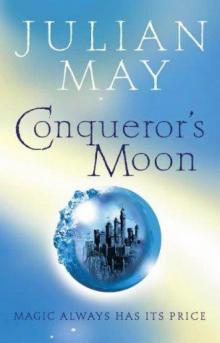 Conqueror's Moon
Conqueror's Moon The Sagittarius Whorl
The Sagittarius Whorl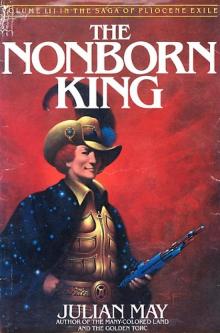 The Nonborn King
The Nonborn King Sky Trillium
Sky Trillium The Sagittarius Whorl: Book Three of the Rampart Worlds Trilogy
The Sagittarius Whorl: Book Three of the Rampart Worlds Trilogy Intervention
Intervention Orion Arm
Orion Arm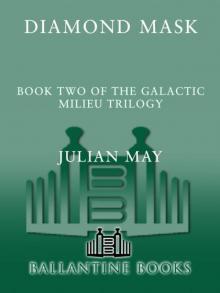 Diamond Mask
Diamond Mask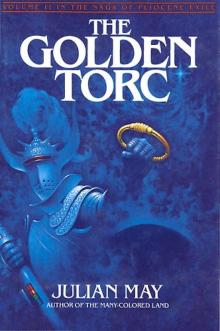 The Golden Torc
The Golden Torc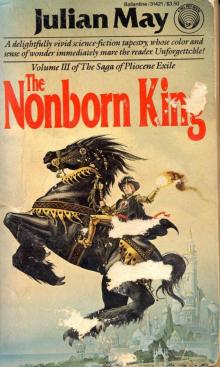 The Noborn King
The Noborn King Magnificat
Magnificat Jack the Bodiless
Jack the Bodiless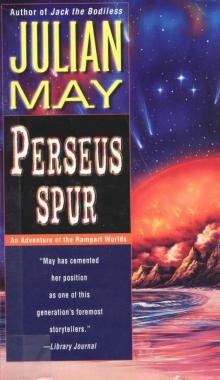 Perseus Spur
Perseus Spur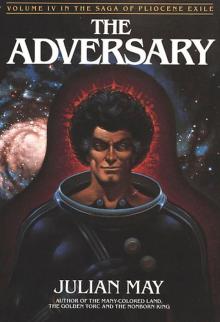 The Adversary
The Adversary Sorcerer's Moon
Sorcerer's Moon Sagittarius Whorl
Sagittarius Whorl The Intervention (Omnibus)
The Intervention (Omnibus) Magnificat (Galactic Milieu Trilogy)
Magnificat (Galactic Milieu Trilogy) Jack the Bodiless (Galactic Milieu Trilogy)
Jack the Bodiless (Galactic Milieu Trilogy)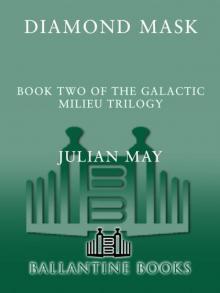 Diamond Mask (Galactic Milieu Trilogy)
Diamond Mask (Galactic Milieu Trilogy) The Many-Coloured Land sope-1
The Many-Coloured Land sope-1